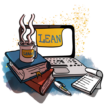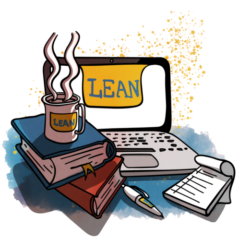-
How it works
How does it work?
Dmaic.com offers comprehensive and fully accredited online Lean training.
Read more Online packagesOnline trainingClassroom trainingsClassroom and in-company training
Online packagesOnline trainingClassroom trainingsClassroom and in-company trainingDmaic.com also offers classroom Lean and Lean Six Sigma training courses Read more
- Pricing
- Companies
- Knowledge
 Knowledge baseWant to know more about Dmaic and what Dmaic means for other companies? Check the Dmaic.com knowledge base.
Knowledge baseWant to know more about Dmaic and what Dmaic means for other companies? Check the Dmaic.com knowledge base. Online WorkshopsDon't immediately choose a course for you: do you want the knowledge and tools with which you can get started right away? Then a Dmaic-workshop is for you.
Online WorkshopsDon't immediately choose a course for you: do you want the knowledge and tools with which you can get started right away? Then a Dmaic-workshop is for you.- About
Lean Methodology and the Toyota Production System
What is the Toyota Production System and How Does It Relate to Lean Methodology?
The Toyota Production System (TPS) is Toyota’s continuous improvement system. Continuous improvement is also known as Kaizen. TPS forms the foundation of present-day Lean. The basis of TPS was developed by Kiichiro Toyoda, Eiji Toyoda, and Taiichi Ohno. TPS focuses on 2 foundations:
- Just in Time (delivering quickly)
- Jidoka (delivering without errors)
This can only be achieved with motivated people and suppliers. This also means that the basis of the Toyota Production System is formed by ‘training’ to develop exceptional people and teams that follow the company’s philosophy for achieving exceptional results. The credo of Toyota is: “Good thinking, Good products.”
Being Lean means involving people in the process and letting them rest so that they can challenge and improve their processes and the way that they are working, and also get the feeling that they can do it. Never waste the creative potential of people!
Total-TPS (T-TPS)
After years of experience with TPS in Japan, Toyota was asked to introduce TPS to the West. During this introduction, continuous improvement was applied by adjusting the original TPS and in western culture, people play an even more autonomous role in the overall process. Toyota has recognized this and amended this to Total-TPS (T-TPS).
When discussing Lean methodology, it’s impossible not to mention the Toyota Production System (TPS), a cornerstone in the world of manufacturing efficiency. TPS and Lean share many principles, making them interdependent in many ways. Understanding the nuances of TPS can offer valuable insights into the broader landscape of Lean methodology.
The Two Foundations of TPS
Foundation 1: Just in Time
This means getting what you need, at the right time and in the right quantity. This principle applies to both internal and external customers. In other words: organize the processes with efficient completion times.
The main elements of Just in Time are:
- One Piece Flow.
- Pull production.
- Production according to Takt-time.
Taiichi Ohno is known as the inventor of the 7 wastes (muda) and based this on the following quote: “Every employee has to know what value he is adding for the customer. You stop every other activity.” The first step to applying Lean is learning how to identify the wastes in processes. Taiichi Ohno identified 7 wastes (the 8th waste was added later):
- Waste as a result of overproduction
- Waste in waiting
- Waste in transport
- Waste in overprocessing (in the process itself)
- Waste in storage
- Waste in movement
- Waste by defects
- Waste by not making use of workforce skills
Mnemonic device = TIMWOODS:
- T = TRANSPORT
- I = INVENTORY
- M = MOTION
- W = WAITING
- O = OVERPRODUCTION
- O = OVERPROCESSING
- D = DEFECTS
- S = SKILLS
Mura and Muri
In addition to muda (wastes), there are also mura (imbalance in the process) and muri (preventing tough work or overburdening).
Foundation 2: Jidoka
Jidoka stands for building in quality and is focused on the prevention of mistakes. If something goes wrong during the production process, the work stops and machines will switch themselves off (autonomy). Everything done to prevent mistakes will be passed on to the following process while striving for perfection. Eiji Toyoda enforced the ‘stop the line’ process where the production line stops when an error is noticed. In this way, mistakes are solved directly. Quality can’t be added by control: when the work has left the workplace, it’s too late. So: don’t pass on wrong products and don’t accept wrong products that go to the next step. Jidoka’s philosophy says that the person who produces work in any given step has the responsibility for the quality of the task that he is performing. When there is a problem, that person is responsible for solving it.
Conclusion
The Toyota Production System serves as a precursor and a parallel to Lean methodology, offering robust frameworks for efficiency, waste reduction, and quality assurance. Adopting the principles of TPS can significantly bolster your Lean initiatives, creating a culture of continuous improvement and excellence.
Become a Lean Expert on Your Schedule: Discover Our Flexible Online Lean Green Belt Training
Ready to finally take a Lean course at your convenience? Look no further! Our online Lean Green Belt training is tailor-made for busy professionals like you. Master the intricacies of Lean methodology at your own pace and from the comfort of your home. Sign up now and take the first step towards becoming a Lean management expert!
Start Your Lean Journey Today!

